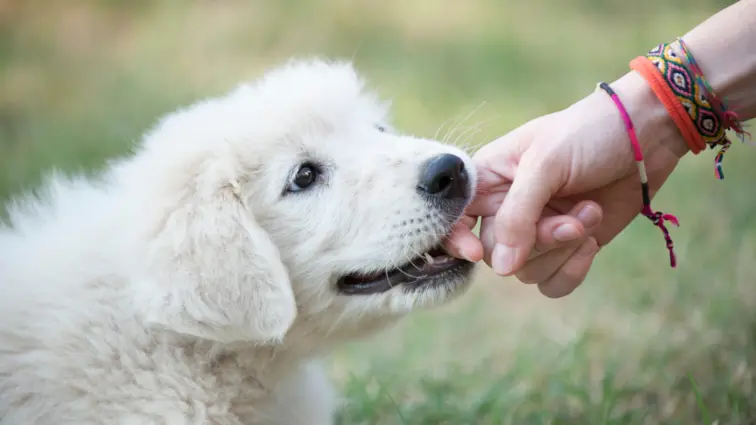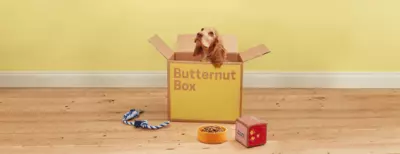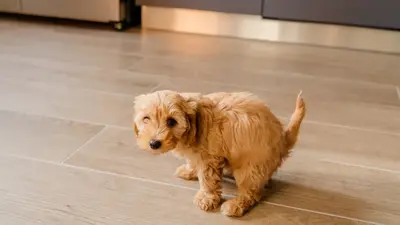How to Stop a Puppy from Biting
- 23 Nov 2023
- 9m read

Advice from our very own Butternut Box Ambassador, Meera. Meera is an IMDT qualified Dog Trainer specialising in puppy training and socialisation, across the Sheffield area.
Why Do Puppies Bite and Nibble You?
The million dollar question! In reality, there are lots of reasons why puppies bite and nibble us, so let’s have a look at the three most common ones:
It’s a sensory thing
Just as babies like to put everything in their mouths to explore the world around them (did you also get into trouble for eating mud as a child?) puppies like to have a little nibble of what (and who) is around them.
When they do this, they are getting lots of information from whatever is in their mouths (including your ankles, fingers or limbs) and most importantly, they’re figuring out how hard they can bite down - which brings me to reason number two…
Bite inhibition
Imagine the strength tester game that you can play at fairgrounds - you don’t know how hard you can hit it, until you hit it. It’s the same thing with puppies, they don’t know how hard they can bite until they have something in their mouths to bite.
By nipping and biting different things, puppies develop bite inhibition. The way that this happens is based on what your puppy is biting and the information that they’re gathering (taste, texture, the reaction they’re getting if they’re biting you). Based on that, they may increase or decrease pressure, bite more / less or stop biting altogether.
Teething
It’s a painful process! Puppies generally go through their worst bit of teething at around 20 weeks of age, which is when their teeth and gums become sore and inflamed, as their adult teeth start to push their way through. It’s not uncommon to notice an increase in your pup’s nipping or biting as they go through the teething process.
However, it is entirely possible that your puppy continues to nip or bite even after they have finished teething. There is a really common misconception that puppies magically grow out of nipping and biting - unfortunately that’s rarely the case.
What Age Do Puppies Stop Biting?
The truth is, there isn’t a specific age at which puppies stop biting - and if anyone tells you otherwise, I’ve got some magic beans for them.
Generally speaking, your puppy should have finished teething by around six months of age, so you may notice they are a little bit less bitey once their puppy teeth are out and their adult teeth are in.
On the topic of puppy teething, if you think your puppy’s teeth are sharp whilst they’re still in their mouth, wait until they start dropping out and you accidentally stand on one. I’d compare it to treading on a piece of Lego - if Lego was made of glass.
As there’s no magic age for your puppy to stop biting, does that mean you need to suffer through 5 months of nipping and biting? Absolutely not!
Does it mean that your puppy will automatically grow out of their nippy habits? Also - absolutely not!
I want you to think of puppy biting as a habit - a bit like biting your fingernails, or eating biscuits on your partner’s side of the bed - these are habits that are often hard to break, no matter your age. The same thing happens with your puppy, nipping and biting is a habit, and the longer they get to practise the habit, the worse it’s going to be for you.
Before we go any further, I want you to think about the habits you don’t want your puppy practising. For example:
I don’t want my puppy chewing the kitchen walls - I’m quite fond of them.
I don’t want my puppy chowing down on my skirting boards - they’re protecting the walls.
I don’t want my puppy biting my *insert body part* - I like my limbs intact.
It’s not just enough to think about the habits that you don’t want your puppy to practise. You also need to think about what you’re going to give your puppy to do instead. This is important if you want to stop your puppy from practising unwanted habits - it’s not fair to your puppy otherwise.
Instead of puppy chewing your kitchen walls, have you invested in appropriate chews and toys for your puppy? Aim for a different range of textures to give your pup plenty of choices. During the teething stage your puppy’s teeth may be sensitive to different temperatures, I’d suggest offering them chews that are at room temperature, and chilled chews too - let your puppy pick which one they prefer.
If your puppy is chewing your skirting boards, chair or table legs, it’s definitely worth considering that they’re looking for something a bit tougher to get their teeth into. Safer substitutes exist, such as olive wood chews, coffeewood or wood root chews.
Be honest - do you make loud noises when your puppy nips you?
Squealing, screaming, shouting no, making high pitched noises are all exciting to your puppy, so it’s not much of a surprise that they’ll do it again and again and again…
How you react to your puppy nipping you will very likely influence their behaviour and habits. It really comes down to teaching your puppy the habits you do want them to practise, rather than only focusing on what you don’t want them to do.
Should I Ignore Puppy Biting?
No, you shouldn’t ignore your puppy’s biting.
Here’s why...
Imagine you’re asking for help with something, and you’re ignored. So you ask again - and you’re ignored. The third time you ask a little bit louder - but you’re still ignored. You ask again, and again and again. Each time, you’re ignored. You still need help, but now you’re feeling fed up, and as if you have no other choice but to scream at the top of your lungs for someone to take notice and help you. And FINALLY, it works! Screaming for help works.
So the next time you’re stuck and need some help - what are you going to do? Ask nicely and be ignored? Or yell your lungs out?
Now let’s translate this into puppy terms:
I wanted to play so I nipped mum’s ankle - it worked. She threw a toy for me, but then she left the room when I nipped her ankle again? I’m so confused.
My mouth is sore because I’m teething. I don’t know how to tell my humans, so I’m going to bite everything in sight and hope that they understand that I’m in pain.
I’m hungry/tired/thirsty - I’m going to tell my family how I’m feeling by nipping them until they get off the sofa and we play the “do you need a wee / poo / drink / nap / cuddle” game - eventually they’ll figure out what I need.
What I mean is, puppy biting is a form of communication - yes I agree that it’s a painful form of communication, but it’s our job to listen to what our puppies are telling us, and definitely not ignore them until they feel like they have no choice but to bark (or bite!) at the top of their lungs.
How to Teach a Puppy Not to Bite
I’m going to share a couple of tips with you - with the advice that if you don’t feel comfortable implementing these training techniques on your own, that you promise to get some help from an accredited, positive reinforcement trainer, who will help you and your puppy (more on that a little bit later).
Tip 1
When your puppy is biting, take your attention away. This may mean you need to stand up, walk away or leave the room. You should avoid shouting “no” or pushing your puppy away. Taking your attention away when the biting starts is really important because it gives the message to your puppy that “you nip, the fun stops”.
Tip 2
Reward the behaviours that you do like. Assuming you’ve taken your attention away when the biting started, it’s only fair to give your puppy attention when the biting stops. But be careful - you really want to focus on calm interactions, otherwise you might end up having to leave the room again.
Tip 3
Play gently, not roughly. Puppies often nip and bite during rough play - because why wouldn’t they want to get their teeth involved? You also need to think about your puppy’s breed and what they were originally bred to do.
For example, if you have a terrier puppy, their job was literally to hunt down prey and hold onto it for dear life, the way that you play tug with a terrier pup is very different to how you’d play it with a border collie pup - who were bred to track and control movements.
Tip 4
Don’t be afraid to ask for help. Raising a puppy is not for the faint hearted, raising a bitey puppy is even harder. Sometimes the best thing you can do is to ask for help from a qualified trainer who only practises kind and positive training methods.
Unfortunately the dog training industry isn’t regulated, and some trainers advocate for the use of heavy-handed and harsh punishment based methods. Now you and I know that your puppy is part of the family, and that you’d never willingly hurt them in the name of training, so please be cautious when looking for a puppy trainer to help you.
Disclaimer: The information provided in this article is not intended as a substitute for an in-depth puppy consultation and bespoke training programme specifically designed to help you and your puppy. To work with Meera directly please visit www.meerapuppins.co.uk/contact/

.jpeg)
.webp)

